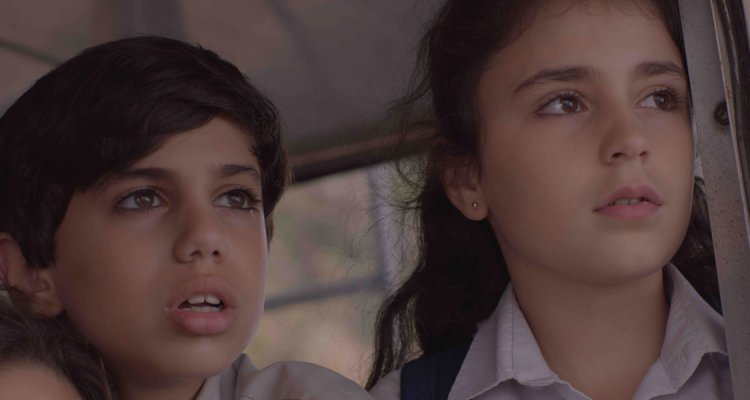Remember when the time between class called recess was all that mattered in your life? A school play yard is a place where two different worlds can simultaneously co-exist. Teachers and students may inhabit the same space, both in and out of the classroom, but are they living in the same reality?
READ MORE: 2019 Toronto International Film Festival: 25 Most Anticipated Movies
“1982,” opens with the title card “based on actual events.” The film is directly inspired by what happened to Lebanese writer/director Oualid Mouaness on his last day of school when he was ten years old — the day Israeli army invaded the city of Beirut. Mouaness’ feature-length debut as a filmmaker is audacious and admirable; it’s very well made, impressively staged and shot with an artistic eye for the smallest of details, but it still reads as emotionally distant, and it doesn’t adequately set up what could have been a fantastic surprise ending.
READ MORE: 2019 Fall Preview: The 45 Most Anticipated Films
The movie follows parallel, overlapping threads: the school staff attempting to hide the recent political upheaval from causing classroom chaos and a young boy named Wissam (Mohamad Dalli), itching to express his feelings to a girl he lives named Joanna (Gia Madi) before she leaves to visit her mother in France for the summer. He leaves a secret note with some drawings in her locker. Wissam’s teacher Yesmine (Nadine Labaki) has a brother who is wrapped up in the military conflict. Her co-worker Joseph (Rodrigue Sleiman) an administrator at the school, argues with her that men like him are what splits their country in two. Yasmine believes both sides are only tearing the state of things apart; everyone is losing.
READ MORE: The Best Films Of 2019… So Far
The staff’s access to updated information about the escalating situation is limited, being nestled up in the mountains. The adults rely on their radios to keep them informed on what is going on while trying to hide the truth of the rocky situation from causing a playground panic. But in the middle of a football game, as a misunderstanding between Wiccam and his friend Majid (Ghassan Maalouf) escalates, a convoy of armored vehicles drives through the school. All roads are soon clogged as planes circle the skies above.
READ MORE: The 100 Most Anticipated Films Of 2019
“1982,” works better as a young adult drama than a political thriller because politics don’t seem to be a considerable part of its agenda. The military situation acts more as a framing device — adding a layer of tension on top a warm and realist coming of age story — than anything else. The movie doesn’t form as strong a foundation for Yesmine character as it does Wissam, so it’s difficult to care as much about the grown-up conflict for the first 2 acts. When the adults argue, it feels more like background exposition than essential information. Kids dropping their marbles in the dirt almost appears direr than the threat of bombs falling, but perhaps the naive point-of-view is the intended statement.
The movie attempts to mask the conflict lurking around the corner for as long as it is able, just as the teachers aim to avoid telling the students anything that may cause a panic for as long as possible, but something is also lost with the lack of harmony. Wissam likes to draw mech characters (think Voltron) in his spare time, and Yesmine asks him about his favorites in one scene. It isn’t clear why this exchange is so important until it suddenly becomes a key component in the climax.
There’s a striking shot early in the film; the camera is placed behind Wissam as he’s sitting and drawing the sky between classes; the white clouds and blue background change to the texture of a crayon doodle. Through both form and function“1982” captures that beautiful sense of childhood innocence—wonder and longing—that always seems to get lost somewhere along the way to growing up, but it still feels less developed than one might expect, for all its distinct and powerful filmmaking craft. The script probably could have used one more pass, to better thread together the thematic overlap of the story more seamlessly; certain narrative promises needed to be planted better.
It’s difficult to talk about some movies without discussing their ending in detail; the final scene of “1982” is a prime example. Being based on Mouaness’s real-life experiences — and one imagines, relieving some of that had to be pretty traumatic — one wonders if the writer/director always had such an ending in mind. It’s an incredibly ambitious finale for a debut film, especially considering the subject matter; it’s a mic drop that’s sure to make or break the movie for most audiences.
You have some measure of respect for what “1982” is reaching for; sadly, it over-reaches, just a tad, not firmly establishing all of its artistic intentions. All the narrative ideas are sound—comparing and contrasting schoolyard perspectives based on age, gender and experience is a great premise—yet for all of its resonant human ideas and modest aesthetic strengths, Mouannes’s film feels a little half-finished. [B-]
Click here for our complete coverage from this year’s Toronto International Film Festival.

